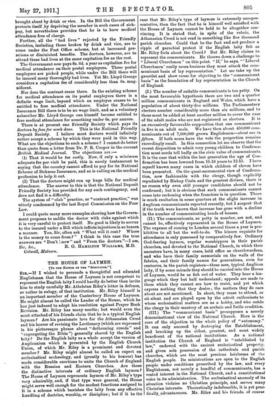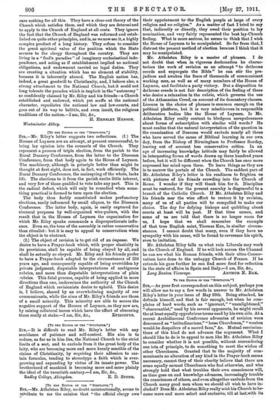THE HOUSE OF LAYMEN.
(To TER EDITOR 01 TUX " SPECTATOR...1
Stir,—If I wished to persuade a thoughtful and educated Englishman that the House of Laymen is not competent to represent the English laity I could hardly do better than invite him to study carefully Mr. Athelstan Riley's letter in defence, or rather in eulogy, of that institution. Mr. Riley himself is an important member of the Canterbury House of Laymen. He might almost be called the Leader of the House, which he has just induced to adopt his resolution against Prayer Book Revision. Mr. Riley has many merits ; but would even the most attached of his friends claim that he is a typical English layman ? Are his passionate love for the Athanasian Creed and his horror of revising the Lectionary (which are expressed in his picturesque phrase about "dethroning creeds" and "expurgating the Bible ") generally shared by the English laity ? Do the English laity as a whole accept the version of Anglicanism which is presented by the English Church Union, of which Mr. Riley is a prominent and devoted member ? Mr. Riley might almost be called an expert on ecclesiastical arehreology, and (greatly to his honour) has made considerable exertions to unite the Church of .England with the Russian and Eastern Churches. Are these the distinctive interests of ordinary English laymen ? The House of Laymen represents laymen of Mr. Riley's type very admirably, and, if that type were general, the House might serve well enough for the modest functions assigned to it in a scheme which banishes the laity from any effective handling of doctrine, worship, or discipline ; but if it be the case that Mr. Riley's type of layman is extremely unrepre- sentative, then the fact that he is himself well satisfied with the House of Laymen cannot be held to be altogether con- vincing. It is stated that, in spite of the rubric, the Athanasian Creed is not read in something like five thousand parish churches. Could that be the fact and not produce a ripple of parochial protest if the English laity felt as Mr. Riley feels about the Creed ? But Mr. Riley claims to represent the communicants. He throws down a challenge to " Liberal Churchmen " on this point. " If," he says, " Liberal Churchmen' really mean business they must attack the com- municant basis of lay representation." Let me take up the gauntlet and show cause for objecting to the "communicant basis" as the foundation of lay representation in the Church of England.
(I.) The number of suitable communicants is too petty. On the most favourable hypothesis there are two and a quarter million communicants in England and Wales, which have a population of about thirty-five millions. The Parliamentary electors number considerably more than six millions, and to these must be added at least another million to cover the ease
of the adult males who are not registered as electors. It is an excessively favourable supposition that one communicant in five is an adult male. We have then about 450,000 com- municants out of 7,000,000 grown Englishmen—about one in fifteen. If both sexes have the vote the proportion remains exceedingly small. In this connection let me observe that the recent disposition to admit very young children to Confirma- tion must needs tell badly on the civic value of communicants. It is the case that within the last generation the age of Con- firmation has been lowered from 15-18 years to 12-15. I have myself known many cases in which children of eleven have been presented. On the quasi-sacramental view of Confirma- tion, now fashionable with the clergy, though explicitly repudiated by Bishop eosin and the greatest divines, there is no reason why even still younger candidates should not be confirmed ; but it is obvious that such communicants cannot come into reckoning when the franchise is in question. There is much exultation in some quarters at the slight increase in Anglican communicants reported recently, but I suspect that if the truth were known that increase has gone with a decline in the number of communicating beads of houses.
(II.) The communicants, so petty in number, are not, and cannot be, effectively represented in the House of Laymen. The expense of coming to London several times a year is pro- hibitive to all but the well-to-do. The leisure requisite for attendance is only possessed by comparatively few. Ordinary God-fearing laymen, regular worshippers in their parish churches, and devoted to the National Church, in which their ancestors have, in many cases, held office as churchwardens, and who have their family memorials on the walls of the fabrics, and their family names for generations, even for centuries, in the parish registers—these men, typical Anglican laity, if by some miracle they should be carried into the House of Laymen, would be as fish out of water. They hear a lan- guage which they but half understand ; appeals are made to them which they cannot see how to resist, and yet which express nothing that they desire ; the matters they do care about are not mentioned. In short, they cease to attend, or sit silent and are played upon by the adroit enthusiasts to whom ecclesiastical matters are as a hobby, and who outdo the clergy in their mastery of an archaic and futile erudition.
(III.) The "communicant basis" presupposes a merely denominational view of the National Church. Here is the core of the objection to the whole policy of " autonomy." It can only succeed by destroying the Establishment, and breaking up the oldest, greatest, and most widely beneficent of the national institutions. As a national institution the Church of England is " established by law," endowed with the ancient ecclesiastical property, and given sole possession of the cathedrals and parish churches, which are the most precious heirlooms of the English people. Its ministrations are open to the English people under conditions prescribed by the law, and every Englishman, not merely a handful of communicants, has a vested interest in the National Church, and a constitutional voice in its administration. The ecclesiastical anomaly of its situation violates no Christian principle, and serves many Christian interests. Theoretically indefensible, it is yet prac- tically a.dvantazeons. Mr. Riley and his friends. of course
care nothing for all this. They have a clear-cut theory of the Church which satisfies them, and which they are determined to apply to the Church of England at all costs. They ignore the fact that the Church of England was reformed and estab- lished on quite other principles, and is, as we now see it, a highly complex product of a long history. They refuse to consider the great spiritual value of the position which the State secures to the clergy throughout the country. They are living in a "fool's paradise" of imaginary ecclesiastical inde- pendence, and acting as if establishment implied no national obligations, and endowment carried no legal duties. They are creating a situation which has no element of stability, because it is inherently absurd. The English nation has, indeed, a great goodwill to Christianity, and, I believe also, a strong attachment to the National Church, but it could not long tolerate the paradox which is implicit in the "autonomy" so confidently claimed by Mr. Riley and his friends—a Church established and endowed, which yet scoffs at the national character, repudiates the national law and law-courts, and goes out of its way to belittle, and even insult, the religious traditions of the nation.—I am, Sir, &c., H. HENSLEY HENSON. Westminster Abbey.











































 Previous page
Previous page